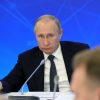In August, the European Commission announced that it had secured 300 million doses of the AstraZeneca jab, with an option for a further 100 million
Credit: Olivier Hoslet/EPA-EFE/Shutterstock
Coronavirus Article Bar with counter
Why would the European Union threaten to block coronavirus vaccine exports?
EU countries have long been waiting for the AstraZeneca vaccine – and now, at the last, it has been snatched from their grasp.
In August, the European Commission announced that it had secured 300 million doses of the AstraZeneca jab, with an option for a further 100 million. With enough doses for 200 million people, the supply could have vaccinated roughly half of all EU citizens.
It brought the European Commission’s highly ambitious target of vaccinating 70 percent of all EU citizens by the summer, and even a revival of the tourism trade, into the realms of possibility.
The European Medicines Agency is expected to grant market authorisation at the end of the week, meaning doses could be shipped out to the member states. But on Friday, AstraZeneca wrote to the EU executive saying it had supply chain problems and would not be able to fulfil its contractual obligations.
The news was a bitter blow to the commission, which has led negotiations in the EU joint vaccine procurement process, but especially for the bloc’s member states. National governments are now faced with the unenviable task of explaining to their voters why the promised vaccines are not coming.
Many EU countries bet on the AstraZeneca jab, foregoing its more expensive and difficult to store rivals.That made it an attractive proposition for poorer member states, and easier to get to more remote areas than those requiring complicated storage technology. They were waiting for the AstraZeneca vaccine, despite growing pressure from their voters.
Dissatisfaction with coronavirus restrictions is growing in Europe, with the Dutch rioting against a coronavirus curfew at the weekend.
Everyone in Europe is also aware that the vaccination rollout is lagging behind Britain’s. That is painful, after Brexit – but there was consolation in the thought that the race would soon be being run on more equal terms.
With some reports suggesting the AstraZeneca supplies could be 50 million lower than expected, that hope has been firmly dashed.
The fact that AstraZeneca had reported no such supply chain difficulties in supplying Britain also raised hackles. The 27 EU member states were furious – and looking for someone to blame.
The European Commission, which has loudly championed its role as the EU’s vaccine negotiator, was determined it would not be the scapegoat. So Brussels served up a sacrificial lamb to the member states in the form of AstraZeneca bosses.
After the CEO was told off by Ursula von der Leyen, the president of the European Commission, the company endured a meeting with the EU health commissioner and the officials from the EU 27.
The discussions were robust but, as the health commissioner said afterwards, "unsatisfactory", and the pharmaceutical giant was summoned for another meeting with the national experts on Monday night. It was a triple humiliation for the company, which was publicly chastened and told to find all the necessary "flexibilities" to fulfil its contract.
The AstraZeneca CEO was told off by Ursula von der Leyen, the president of the European Commission
Credit: Francois Walschaerts/AFP
The EU said it had invested in the future supplies of the vaccine and wanted a return on that investment.
The commission has used the coronavirus crisis to assertively stake out an EU-wide co-ordination role in the response to the pandemic. In truth, Brussels does not have the centralised powers necessary in health or the control of borders to contain the pandemic. It can recommend member states take a certain course of action, but the decision remains national.
That has not stopped some national governments from "Brussels-bashing" to avoid blame for their own failures in the slow vaccination rollout. Nor has it stopped the constant flood of commission social media messages, lionising its role at the heart of a European response to the crisis.
The chat in Brussels is that there are two explanations for AstraZeneca’s failure to deliver. Either there are genuine production difficulties, which is feasible given that this is a complex vaccine, or something more sinister.
Although much of the UK stock is now made in Britain, the UK did rely on AstraZeneca’s EU plants for supplies last year. There are those in Brussels who think that AstraZeneca vaccines, paid for in advance and originally meant to build up the EU vaccine stock, have ended up in non-EU Britain.
Diplomatic sources admit they have no idea if this is true but, until AstraZeneca comes forward with a satisfactory explanation, the story continues to have legs in the Belgian capital.
The commission is calculating a system to keep tabs on EU-produced vaccines, and the possibility of blocking exports may just be enough to draw their attention away from the executive’s errors. It is a show of strength aimed at reassuring member states and citizens that this will never happen again, and an attempt to reassert some very publicly lost control.























































Свежие комментарии